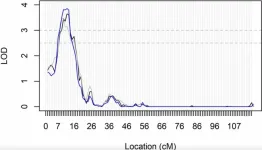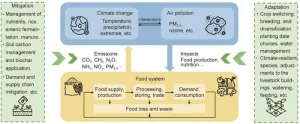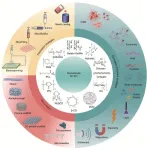(Press-News.org) Study compares those with food insecurity to food-secure individuals over 20 years
Food insecurity is associated with a 41% increased risk of heart disease over time
Findings suggest food security screening as a key tool to prevent heart disease
CHICAGO --- Struggling to afford food today could mean heart problems tomorrow. Young adults experiencing food insecurity have a 41% greater risk of developing heart disease in midlife, even after accounting for demographic and socioeconomic factors, according to a new Northwestern Medicine study. Food insecurity — struggling to get enough nutritious food to stay healthy — affects one in eight households in the U.S. each year.
“We’ve known that food insecurity and heart disease often go hand in hand, but this study shows, for the first time, that food insecurity comes first,” said Dr. Jenny Jia, an instructor of general internal medicine and preventive medicine at Northwestern University Feinberg School of Medicine and a Northwestern Medicine internist. “That makes it a clear target for prevention — if we address food insecurity early, we may be able to reduce the burden of heart disease later.”
The study will be published on Wednesday (March 12) in JAMA Cardiology.
How the study was conducted
Jia and her colleagues analyzed data from the Coronary Artery Risk Development in Young Adults (CARDIA) study, a long-term cohort study that has followed Black and white U.S. adults since the mid-1980s. The scientists identified participants who reported food insecurity in 2000-2001, when they were in their early 30s to mid-40s, and compared their health outcomes over the next 20 years to those who were food secure.
Among the 3,616 study participants, those experiencing food insecurity were 41% more likely to develop cardiovascular disease than their food-secure counterparts. Over the study period, 11% of food-insecure individuals developed heart disease, compared to 6% of those with adequate food access.
“For a long time, there was this chicken-or-the-egg question — does food insecurity cause heart disease, or does heart disease make food insecurity worse because of the high cost of healthcare?” Jia said. “By following people over two decades, we were able to show that food insecurity, on its own, significantly increases the risk of developing cardiovascular disease.”
At baseline, participants with food insecurity were more likely to identify as Black and had lower educational attainment than those who were food secure.
Screening for food insecurity
Jia says the findings highlight the need for healthcare providers to be savvy in how to best screen for food insecurity and connect patients with community resources.
She says primary care settings, such as with internists, pediatricians and family doctors, are ideal for screening for food insecurity, “because there tends to be a lot of trust between primary care providers and patients.”
Jia also stresses that food security screenings could extend to emergency rooms and specialties like cardiology, and can be done by nurses, medical assistants or even patients themselves filling out forms.
“The more we screen for it, the better,” Jia said, adding that “we need better strategies to help people once they screen positive. Do we connect them to social workers who can refer them to existing community programs? Should healthcare systems develop their own interventions? These are the next big questions.”
Next steps
Jia and her team plan to continue tracking this group to understand the long-term effects of food insecurity. “It’s surprising to see heart disease in this group, which doesn’t include those 65 or older,” Jia said. “As they near 80, we plan to revisit the study to explore the evolving link to heart disease.”
The CARDIA study was conducted and supported by the U.S. National Heart, Lung, and Blood Institute (NHLBI) in collaboration with the University of Alabama at Birmingham (75N92023D00002 and 75N92023D00005), Northwestern University (75N92023D00004), the University of Minnesota (75N92023D00006) and the Kaiser Foundation Research Institute (75N92023D00003). Dr. Jia is supported by grant K23HL173655 from the NHLBI. Dr. Kandula (another study author) is supported by grant K24HL155897 from the NHLBI.
END
Food insecurity today, heart disease tomorrow?
Study is the first to show food insecurity raises risk of heart disease over time
2025-03-12
ELSE PRESS RELEASES FROM THIS DATE:
Food insecurity and incident cardiovascular disease among Black and White US individuals
2025-03-12
About The Study: In this prospective cohort study among participants in the Coronary Artery Risk Development in Young Adults (CARDIA) study, food insecurity was associated with incident cardiovascular disease (CVD) even after adjustment for socioeconomic factors, suggesting that food insecurity may be an important social deprivation measure in clinical assessment of CVD risk. Whether interventions to reduce food insecurity programs can potentially alleviate CVD should be further studied.
Corresponding Author: To contact the corresponding author, Jenny Jia, MD, MSc, email jenny.jia@northwestern.edu.
To access the embargoed study: ...
Association of diet and waist-to-hip ratio with brain connectivity and memory in aging
2025-03-12
About The Study: This cohort study found that healthier diets and lower waist to hip ratio throughout midlife were associated with better brain and cognitive health in older age. The findings suggest that interventions to improve diet and manage central obesity might be most effective between ages 48 and 70.
Corresponding Author: To contact the corresponding author, Daria E. A. Jensen, DPhil, email jensen@cbs.mpg.de.
To access the embargoed study: Visit our For The Media website at this link https://media.jamanetwork.com/
(doi:10.1001/jamanetworkopen.2025.0171)
Editor’s Note: Please see the article for additional information, ...
Evolution and current challenges of gastrointestinal endoscopy in Nigeria: insights from a nationwide survey
2025-03-12
Background and objectives
Gastrointestinal endoscopy has revolutionized the entire practice of gastroenterology worldwide, including Nigeria. Endoscopy was introduced in Nigeria more than four decades ago, and it has been a story of varying successes and challenges. This study explored the various experiences of endoscopists, the challenges they face, and the efforts put in place to maintain the practice in Nigeria.
Methods
This cross-sectional survey was conducted from October to December 2023 among endoscopists practicing ...
Transgender and gender diverse people less likely to receive follow-up after a mental health hospitalization
2025-03-12
Toronto, ON, March 12, 2025—Transgender and gender diverse individuals who were hospitalized for psychiatric care were less likely to have a follow-up visit compared to the general population, suggesting they face transphobia in the hospital system.
In a new study from ICES and the Centre for Addiction and Mental Health (CAMH), findings demonstrate that transgender and gender diverse (TGD) people face an interesting paradox: they have lower access to appropriate mental health care and support following a psychiatric hospitalization, yet have better follow-up after an emergency department (ED) visit. According to Statistics Canada, TGD people account ...
Long-lived families show lower risk for peripheral artery disease
2025-03-12
“Notably, the findings from this work may provide novel insight into the underlying mechanisms of PAD and, perhaps, have prevention or therapeutic impacts.”
BUFFALO, NY — March 12, 2025 — A new research paper was published in Aging (Aging-US) on February 25, 2025, Volume 17, Issue 2, titled “Epidemiology and genetic determination of measures of peripheral vascular health in the Long Life Family Study.”
Researchers from multiple institutions, led by first author and corresponding author ...
Food systems, climate change, and air pollution: Unveiling the interactions and solutions
2025-03-12
A recent review published in Engineering delves into the complex relationships among food systems, climate change, and air pollution, highlighting the need for sustainable strategies to address these interconnected global challenges.
Climate change and air pollution pose significant threats to food systems. Rising temperatures, altered precipitation patterns, and extreme weather events, driven by climate change, disrupt agricultural production. For example, higher temperatures and shifting precipitation patterns have altered crop growth cycles, caused yield fluctuations, and increased uncertainty ...
Tissue engineering offers new hope for spinal cord injury repair
2025-03-12
A recent study published in the journal Engineering delves into the application of tissue engineering in spinal cord injury (SCI) repair, presenting a comprehensive review of the latest research and potential treatment strategies.
SCI is a severe condition that affects the central nervous system, often leading to permanent loss of sensation and motor function. Current treatments, such as surgical decompression and drug therapy, can only alleviate symptoms to a certain extent, making it crucial to explore new therapeutic approaches. Tissue engineering, an interdisciplinary field integrating life science, material science, engineering technology, ...
Preclinical study finds earlier ACL reconstruction is associated with lower risk of knee osteoarthritis
2025-03-12
A preclinical study by HSS investigators found that earlier anterior cruciate ligament (ACL) reconstruction led to lower immune cell activity, less inflammation and fewer joint changes associated with knee osteoarthritis compared to delayed surgery. The research team shared their study results today in a poster presentation at the American Academy of Orthopaedic Surgeons 2025 Annual Meeting.
After a knee injury, such as an ACL tear or rupture, immune cells travel to lymph nodes, where they interact with ...
Assessing pain, anxiety and other symptoms of nursing home residents unable to speak for themselves
2025-03-12
INDIANAPOLIS – As many as half of nursing home residents are cognitively impaired and may be unable to communicate symptoms such as pain or anxiety to the staff and clinicians caring for them. Therefore, information needed for the evaluation of symptoms and subsequent treatment decisions typically does not reliably exist in nursing home electronic health records (EHRs).
A new paper reports on the novel adaptation of a commonly used symptom assessment instrument to more comprehensively acquire this difficult-to-obtain data with the ultimate goal of enabling knowledge-based expansion of palliative care services in nursing homes ...
Thirty-three centers join new Bronchiectasis and NTM Care Center Network
2025-03-12
Miami (March 12, 2025) – The Bronchiectasis and NTM Association has accepted 27 Care Center and six Clinical Associate Center sites in 23 states and the District of Columbia into the new Bronchiectasis and NTM Care Center Network (CCN).
The CCN aims to facilitate access to specialized care and support for the hundreds of thousands of people with bronchiectasis and nontuberculous mycobacterial (NTM) lung disease.
“As the prevalence of bronchiectasis and NTM lung disease grows, it is even more important for us to create this Care Center Network to improve ...
LAST 30 PRESS RELEASES:
Trapping light on thermal photodetectors shatters speed records
New review highlights the future of tubular solid oxide fuel cells for clean energy systems
Pig farm ammonia pollution may indirectly accelerate climate warming, new study finds
Modified biochar helps compost retain nitrogen and build richer soil organic matter
First gene regulation clinical trials for epilepsy show promising results
Life-changing drug identified for children with rare epilepsy
Husker researchers collaborate to explore fear of spiders
Mayo Clinic researchers discover hidden brain map that may improve epilepsy care
NYCST announces Round 2 Awards for space technology projects
How the Dobbs decision and abortion restrictions changed where medical students apply to residency programs
Microwave frying can help lower oil content for healthier French fries
In MS, wearable sensors may help identify people at risk of worsening disability
Study: Football associated with nearly one in five brain injuries in youth sports
Machine-learning immune-system analysis study may hold clues to personalized medicine
A promising potential therapeutic strategy for Rett syndrome
How time changes impact public sentiment in the U.S.
Analysis of charred food in pot reveals that prehistoric Europeans had surprisingly complex cuisines
As a whole, LGB+ workers in the NHS do not experience pay gaps compared to their heterosexual colleagues
How cocaine rewires the brain to drive relapse
Mosquito monitoring through sound - implications for AI species recognition
UCLA researchers engineer CAR-T cells to target hard-to-treat solid tumors
New study reveals asynchronous land–ocean responses to ancient ocean anoxia
Ctenophore research points to earlier origins of brain-like structures
Tibet ASγ experiment sheds new light on cosmic rays acceleration and propagation in Milky Way
AI-based liquid biopsy may detect liver fibrosis, cirrhosis and chronic disease signals
Hope for Rett syndrome: New research may unlock treatment pathway for rare disorder with no cure
How some skills become second nature
SFU study sheds light on clotting risks for female astronauts
UC Irvine chemists shed light on how age-related cataracts may begin
Machine learning reveals Raman signatures of liquid-like ion conduction in solid electrolytes
[Press-News.org] Food insecurity today, heart disease tomorrow?Study is the first to show food insecurity raises risk of heart disease over time


